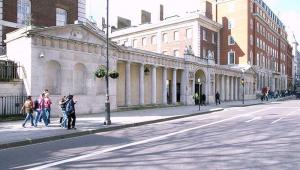25 January 2008
This year has got off to a somewhat odd start, with the word that dared not speak its name – nationalisation – back from the dead, and even state ownership of body parts up for debate
The N word is back. No, not the race one — but nationalisation. The most obvious place it has reappeared is in the prolonged debate about what to do about Northern Rock. But it has cropped up in several other policy controversies as well — not least Prime Minister Gordon Brown's suggestion that we should nationalise corpses (which is effectively what the organ transplant proposals amount to).
In some ways, this is a quite weird resurgence of an old debate that many thought had been laid to rest in the 1990s. When the dust settled on the big Conservative privatisations of the 1980s and New Labour abandoned Clause Four (the section of the Labour Party constitution that committed it to widespread public ownership), it seemed we had reached a new national consensus about the role and scope of the state.
The old Left-Right debate about the state versus the market seemed almost irrelevant. There was talk of the new 'post-ideological age'. But old fault lines in politics never seem completely to go away.
There is, of course, a large dose of political theatre in the debate about Northern Rock. The Tories spotted an opportunity to hark back to the bad old days of Labour, when the Militant Tendency ran rampant and nationalised industries were almost a synonym for the 'British disease'. Just when we thought the French had taken on our old mantle, here we are back to debating public ownership, say the Cameroonies.
Most of the debate in the past decade has actually been the other way, ie, rows within the labour and trade union movement about the steady trickle of New Labour denationalisations. Most of these have been relatively easy for the government, reflecting the much-weakened position of the Labour Left and trade union activists. A few have proved rather embarrassing for other reasons — such as the appallingly badly handled Qinetiq sale. Here, it has been the auditors and Parliament that have caused the government pain rather than the Left.
The truth is, of course, that political rhetoric — from both Left and Right — has never even remotely matched reality. Throughout the twentieth century, first Liberal and later Conservative governments were involved in both nationalisations and expanding state provision across a range of areas. The Thatcher government — committed to 'rolling back the frontiers of the state' — presided over the highest level of public spending, as a proportion of national wealth, over the past 50 years, while Labour produced the lowest (in 1998). And Labour never got anywhere near nationalising the 'commanding heights' of the economy.
True, the 1980 privatisations saw the state withdraw from some obviously commercial areas like car production. Some of the withdrawals from more naturally monopolistic areas, such as power, railways and water, remain a bit more controversial and problematic. But, interestingly, public spending as a proportion of gross domestic product hardly changed at all as a direct result of these privatisations — the current level (around 42%) is also about the 40-year average.
No major political party in the UK now proposes any substantial change in the boundary between state and the private sector. Under Tory plans, public spending would probably shrink slightly as a proportion of national wealth, while under the Liberal Democrats it would probably grow slightly. New Labour has more or less stabilised it (although the recent spending round very slightly reduced it — by 0.8%).
Nor does anyone propose big nationalisations or big privatisations. So the furore over the N-word around Northern Rock is largely political froth. The Conservatives are making mischief. The situation is also being gleefully exploited by some reporters, whose memories are clearly longer than their sense of proportion.
The truth is that a bank whose faulty business model fell foul of world financial conditions was in danger of triggering a cascade of panic. The government stepped in to prevent this and is now stuck with effectively owning Northern Rock. As Lord Eatwell pointed out last week, if you define ownership by who holds the risk, we the public already own Northern Rock.
It now looks increasingly likely that the government is going to adopt a very 'Third Way' solution of having Northern Rock in some weird hybrid public-private status rather than risk being accused of nationalisation — privatising most of the profits while nationalising most of the risk.
The issue of organ transplants and ownership of dead people's organs is much more tricky. Some Tories are ideologically opposed to presumed consent, and so are some religious groups. What this illustrates is that the debates about the boundaries between public and private have not entirely gone away, but today they are mainly either purely pragmatic (Northern Rock) or deeply moral (organs), rather than ideological.
Colin Talbot is professor of public policy and management and director of the Herbert Simon Institute at the University of Manchester
PFjan2008



















